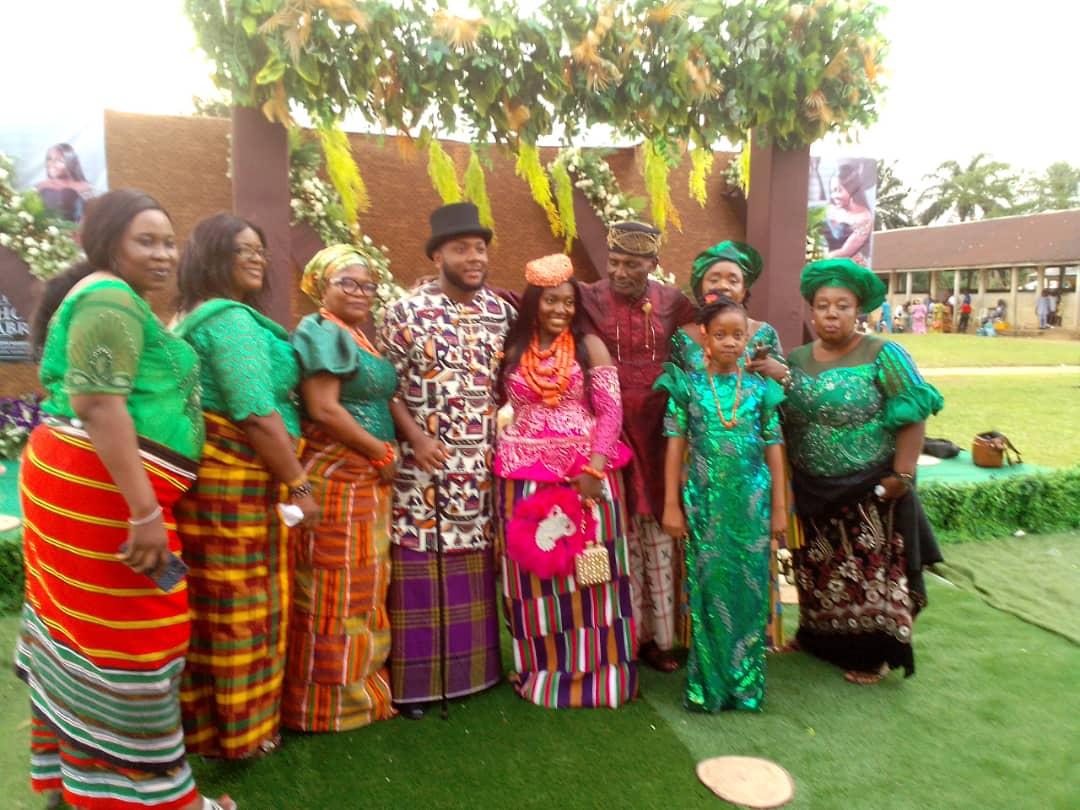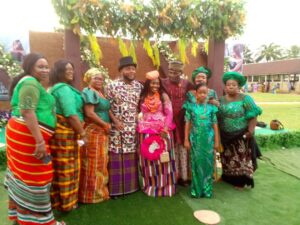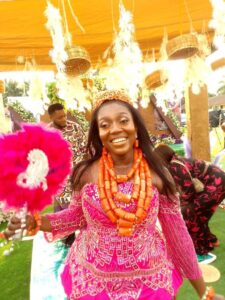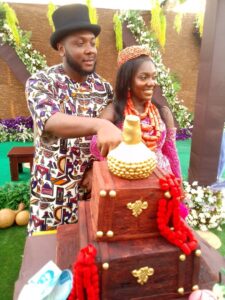Women
What Is The Fate Of Nigerian Woman?
For a long time, women all over the world have been crying
wolf of marginalisation without adequate measures to tackle this gender
inequality. The cry is louder and much more pronounced in Africa, especially in
Nigeria where the stakes of every woman is tied to the patriarchy of man.
There is no contesting the fact that man, from the time of
the first man, Adam, is the head of the family. But it is also unarguable that
God created Eve as a supporting partner, and not a female servant to Adam. In
today’s world, however, the male-female domination has assumed an irritating
phenomenon such that women have little or no say in home affairs, let alone in
the larger society.
This is particularly so because statistics reveal gender
gaps in health, education, workloads and earnings, among others. According to
UNESCO, two out of three women cannot read or write, and more than 60 per cent
of children out of school are female.
This gender inequality has again subjected women to several
abuses such as battering, rape and home slavery. Even when a man is caught
having an affair with a house-help, a woman is denied the right to complain.
Whereas such transgression is capable of causing a woman outright divorce. What
an injustice?
In the same vein, most women have been made to assume the
status of a house-help. Many men do not allow their wives to work in spite of
their education. They prefer limiting their women’s roles to the kitchen. Even
the few women that work are over-burdened with domestic chores without men
lending them helping hands.
The Commission on the Status of Women of the Economic and
Social Council of the United Nations had noted in a draft statement by 18
international women’s advocacy groups in 1995 that improving the status of
women is not a woman’s issue, it is a human issue. It is time, therefore, to
take action in this area.
President Goodluck
Jonathan’s administration has tried to break this gender inequality through the
Affirmative Action Plan that cedes 35 per cent of appointment to women.
This brings us to the
question of what role the Nigerian woman is expected to play now and in the
future. Without pre-empting what other people may say, I hasten to suggest that
several important roles and responsibilities are yearning for the attention and
utilisation of the Nigerian woman now and especially in this millennium. I am
saying this, because, if the Nigerian woman must make a giant leap into the
future, she must be prepared to assume giant roles and responsibilities and
should not expect roles to be given her by the male.
The Nigerian woman has in many ways proved that, apart from
the competency they have in performing domestic roles, they have also
demonstrated that what a man can do, they (women) can do better. This is proven
by the Minister of Finance and Coordinating Minister of the Economy, Mrs Ngozi
Okonjo-Iweala, and the former National Food and Drug Adminsitration and Control (NAFDAC) boss, Professor (Mrs)
Dora Akunyili.
Also, despite the tremendous achievements of the Nigerian
woman in the execution of the lofty ideals of the Family Support Programme
(FSP) during the Ibrahim Babangida days,
and the Family Economic Advancement Programme (FEAP) initiated by the
former First Lady, Mrs Mariam Abacha, there exists so much bumps on the road to
the Nigerian woman’s empowerment in this country.
These challenges require the concerted effort by the women
themselves to smoothen. This does not mean that the men should not support the
empowerment which, of course, I think without them (men) supporting the women,
the Nigerian woman won’t get to anywhere since for now men occupy more than 60
per cent of the sensitive positions in
the society.
A Mexican non-governmental organisation sometime ago, raised
a poser that, “how can we empower women if we don’t empower men too?”
This is an important question because men also need skills to adjust to new male matrimonial and
social roles which should emerge in this wake of women empowerment in this
millennium. In other words, women’s awareness of their potential,
responsibilities and choices as women is, if I may suggest, inextricably tied
to the empowerment of men, naturally.
I do not wish to be misconstrued on this matter as I have
only attempted to illuminate, at least superficially, the broader concept of
“gender in development” in contrast to the narrow slogan of “women in
development” in the strong conviction that as a lady, both men and women are so
intrinsically bound that a meaningful symbiotic relationship is necessary for
the realisation of the dream of the 21st century Nigerian woman to be
fulfilled.
The United Nations’ publication, The World’s Women, 1995
regrets that “too often, women and men live in different worlds, worlds that
differ in access to education and work opportunities, and in health, personal
security and leisure time.”
Seventy per cent of food is grown by women yet, according to
a United Nations’ report, the same percentage of the world’s 1.3 billion people
who live in abject poverty are women. In fact, poverty has a woman face.
As I pointed out earlier, these problems would require
everyone’s efforts. But the women have to initiate remedial measures to solve
them instead of waiting for the male folk who are good in complementing women’s
efforts.
In Peru, for example, men have enthusiastically supported
800 community kitchens run by 16,000 women in Lima. In Bolivia too, mothers
clubs promoting small enterprises proved so successful that most men now
participate in them under women’s control.
The Nigerian woman should, therefore, come to grips with the
reality that as the weaker sex as against the men who are strongest, they alone
can, and would effectively, hold their destiny in their own hands and chart a
path for the 21st century Nigerian woman.
Rather than hang on to the male identity or crying wolf
against men or apportioning blames on men or even looking for scape-goats,
Nigerian women should close ranks and be more creative, more dynamic and more
useful to themselves in the society. If the female folk do not tackle their problems
this way, they may be lending credence to the erroneous impression that they
are in bondage, whereas they are not.
I pray and suggest to the women that once we can hold our
own as in the Peruvian and Bolivian examples, and contribute positively wherever
they can, the sky would certainly be the limit for the 21st century Nigerian
woman.
Susan Serekara-Nwikhana
Women
The Desire Of Every Woman In Marriage

A woman needs a man that is honest, trustworthy, nice, loving and financially stable.
There are no two ways about finance in marriage. No matter the level of love, If there is no money, it is always difficult.

Referring to the Biblical belief in Genesis 3:Your desire shall be unto you……..
That is one aspect the woman expects her husband to take care of.
A woman wants a husband that is not lazy, at least helping to do one or two things. A man that is educated and intelligent.
She knows that there is a trait that her husband has. Traits of taking care of people, giving freely to people and caring for her family.
A woman wants to love a husband that has family interest at heart. A man that spends time with his family, remembering his family even as he is away from home.
A woman should not antagonise her husband because of one error or the other. No matter the level of offence he may have committed, you still show some love.

According to the Scripture, it is with wisdom that the women builds her home.
It is not as if the woman will not monitor her husband, but to certain limit. Don’t be a monitoring spirit. Don’t allow anything to take your joy.
Don’t loose trust in your husband.
The idea of checking your husband’s phone should be discouraged. The more you check your husband and his phone, the more you loose your joy.

The home should not be a battle ground for a woman and man. A woman should be able to ask herself if the check on her husband will pay her any good.
Draw a line to a point where you checkmate your husband’s activities.
A woman wants a man that will love her and telling her you love her will be all she desires.
Eunice Choko-Kayode
Women
What Women Want In Yet-To -Be Husbands
What women want in their yet-to- be husbands matters a lot as far as marriage is concerned.
A woman desires a good fnancial prospect. Interestingly, some modern women place a man’s financial potential as more desirable than they have in the past.
Many decades ago, women ranked it lower on the list. It still comes in after items like love and maturity, but perhaps today’s women realise that a good economic partner is good husband material.
Good health has been an important characteristic for women through the 20th century and remains so these days. One might argue that because we’re living even longer, health plays a huge role in the success of a marriage. Women are anxious to know that their partners are healthy to be able to run the family together.
You discover that in most faith based organisations, would- be couples are mandated to go for medical tests to ascertain their health status as it concerns HIV/AIDS, Genotype and other related ones. This according to stakeholders is to ensure that couples raise healthy families.
Ambition has become less important to women over time, though it still being considered even if women nowadays are thriving in the workforce competing with the male folk. It may be because more women are thriving in the workforce, they want a husband who has earning power but are not looking for him to be the sole provider.
More women want husbands with pleasing disposition. They may not want a man who is always moody. A man who is always cheerful is whom they desire.
Surprisingly, a man’s likes do not rank as high on women’s list of wants as it used to. Until recently, women are more willing to accept a man for who he his, despite the inevitable mood he may be.
Sociability from both men and women rank very high on their marriag material list. And for both sexes, it has been steadily moving up the list for many years. The rise of the “love marriage,” a partnership based on attraction rather than practicalities (like wealth or status) might mean that married couples are more likely to be friends and have mutual circles of friends.
A lot of couples want to associate with others and then socialise. Attending parties of other friends forms part of their marriage requirements.
Women have placed education and intelligence top making it one of their most desirable male traits for decades. This timeline coincides with more and more women receiving college education themselves. Once education becomes important in women’s lives, it is a more attractive trait in potential husbands.
Of course when a woman is educated, she is likely to go for an educated man. When they are gainfully employed, their income boost the family affairs faster.
Today, women are much more attracted to men who are interested in home and family than they ever have been. Men who have desire for their home and children is whom they desire.
After a days job, a man will come home to ensure that his children are comfortable. Because most women today are expecting to be in dual-earner relationships, they want husbands who will be happy and willing to contribute at home. More women today even report that they hope he will take the lead at home.
A woman wants a man who is emotionally stable and mature. Growing big physically is not the issue but maturity in the heart.
Men, too, place a heavy emphasis on a potential wife’s emotional maturity, signaling that it is a key quality for a stable partnership. Women seem to look past appearance to the heart of the matter.
A woman wants a man who is not easily provoked. Dependable character is what some women want in marriage.
Women want husbands that they can count on, and this has not changed in recent years. Yes, women look to their spouses to be lovers and friends, they also want them to be supportive and trustworthy. They want to know that their husbands will be there and remain loyal. Men, too, desire dependable character from their yet-to be wives.
Mutual attraction and love from the first appearance is what they want till they become old.
The highest-rated characteristic women seek from men is mutual attraction and love. Some no longer look for a man who will provide everything, afterall they are also educated and are gainfully employed, they want to be in love.
For some women, even when the man do not provide household needs, the love shown on her is enough. When women had no job prospects and needed to marry, they desired love . The women’s movement has not only helped women pursue careers, it has also given them more choice in love.
Women
Echoes Of IWD : Need To Invest In Women
As this year’s Internatinal Women’s Day (IWD) has come and gone, there are calls from different quarters on the need to invest in women so that we can achieve accelerated growth.
It was, indeed, a thing of joy when Rivers Women Unite For Sim, took delivery of large quantities of sanitary towels and some bags of rice provided them for this year’s celebration.
Many young women expressed joy that they got such gesture since some of them have financial problems getting sanitary towels whenever they are on.
Some secondary school students were also lucky to have a share of the benefits. They also got some sanitary towels.
The Rivers State Commissioner for Women Affairs organised a platform to celebrate and honour the women for the remarkable jobs they perform in their homes and society.
Addressing women on the occasion, the Hon. Commissioner for Women Affairs, Dr. Roseline Apawari Uranta, noted that women from time immemorial have been great pillars in achieving remarkable heights and stressed that IWD across the globe is pivotal all women for the roles they play in bringing, nurturing and sustaining life.
Dr. Uranta said that IWD, which started in 1911 and celebrated annually on March 8, is a global day that provides women a platform to address economic inclusion, participation in political and public life.
She said the day was set aside to look into lack of access to education for the girl-child, gender-based violence, child marriage, child trafficking, harmful cultural practices as well as other challenges facing women around the globe.
The Hon. Commissioner, who described March 8 as a day to celebrate the socio-economic, cultural and political achievements of women, emphasised that it is a day that offers women the opportunity to reflect on progressive achievements.
Noting that it is an opportunity to call for change, she stressed that it is also an opportunity to celebrate acts of courage and every achievement made by ordinary women who did extraordinary things and are remembered in history.
She noted that the IWD2024 theme:”Invest In Women, Accelerate Progress”, is timely and apt because according to her, to achieve gender equality, we must ensure that the rights, responsibilities and opportunities of women do not elude them.
Her words: ” We must see investing in women as a human right issue and consider investing in women as a social tool to eradicate poverty since women are helpmeet in the homes while a handful are breadwinners in their respective families”.
The commissioner urged women to uphold the deliberate act of investing in themselves, be it furthering formal education, developing a new skill as well as learning a trade.
“Shun idleness, always find something positive and productive to do, regardless of your age, social status and financial capabilities”, she said.
In a paper presentation, Dr. Dabota God’swill Jumbo, reiterated that investing in women would attract good and positive dividends to herself and the society at large and noted that it is essential in addressing poverty, hunger and climate change.
The guest speaker said women need more opportunities in elective and appointive positions, hence the need to encourage and support them in politics.
According to her, when you invest in women, they will be able to create safer environment devoid of gender-based violence.
In a goodwill message, the spokesperson, Rivers Women Unite For Sim, Mrs Charity Deemua appreciated the organisers for making it possible for women to gather and celebrate themselves.
She commended those who created a day like March 8 of every year to celebrate women and regretted that the girl-child was seen as a second-class person decades ago.
The former commissioner, Rivers State House of Assembly Commission, described those who taught it wise for women to celebrate as conquerors, tough and strong.
International Association of World Peace Advocates, a world-class organisation with the United Nations, honoured different categories of women.
In Cross River State, 150 women were empowered with about N15m to boost their small and medium scale businesses.
According to stakeholders, the women empowerment is vital in addressing social, economic and political challenges and will make them self-reliant.
An NGO, Association of Professional Women Engineering Technologists (APWET), said it’s aim is to promote professional excellence among engineering personnel, advocating for women and girl-child education.
With what we saw in terms of response to women’s call on issues affecting them from relevant authorities, we are optimistic that the women will do better whenever they are empowered.
If we must kick out cervical, breast and other forms of cancer in women, underage marriage, prostitution, we must invest in women.
There were goodwill messages from National Council for Women Societies (NCWS), International Federation of Female Lawyers (FIDA), Medical Women Association of Nigeria (MWAN), Nigeria Copyright Commission (NCC, Nigeria Association of Female Journalists (NAWOJ), among others.
By: Eunice Choko-Kayode
-

 News1 day ago
News1 day agoWe Operate Transparent Accounting System
-

 Business1 day ago
Business1 day agoCustoms Backs Locally-Made Vehicles
-

 News1 day ago
News1 day agoFleeing Villagers Storm Zamfara Government HouseTo Seek Protection
-

 News1 day ago
News1 day agoEx-Senate President Donates School, Healthcare Centre To Yobe Govt
-

 Niger Delta1 day ago
Niger Delta1 day agoIndorama Denies Alleged Environmental Pollution
-

 News1 day ago
News1 day agoFAAC: FG, States, LGs Share N1.123trn
-

 Business1 day ago
Business1 day agoNCDMB Rakes In $1m Return On NEDOGAS Investment
-

 News1 day ago
News1 day agoITF Expends N1.1bn On SIWES Allowances-DG

